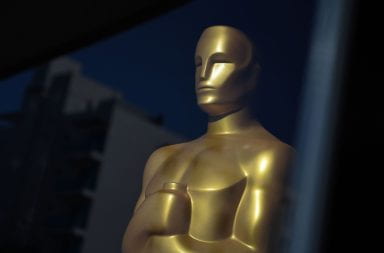
Preparation for the 90th Oscar Academy Awards began earlier this week outside Dolby Theater in Hollywood, Los Angeles. Credit: Courtesy of TNS
Though the 90th Academy Awards show is set to recognize diversity and minorities in the film industry, political protest during the award show remains a cause of contention.
The 2018 Oscars has shown a commitment to diversifying its finalists, and this year’s Best Picture and Cinematography nominees are no exception. With a racially charged horror film in the running and the first woman nominated for Best Cinematography, the award show is continuing to make changes after past criticisms of “Whitewashing” and sexism.
With cultural movements like #MeToo and Time’s Up dominating Hollywood, the Oscars have made a significant effort to recognize women in the industry. For example, the academy has recognized Cinematographer Rachel Morrison for the film “Mudbound,” as the first female nominee in that category, and Greta Gerwig will be the fifth woman nominated for Best Director with “Lady Bird.”
The nominations for the Best Picture category have also made great strides. In 2010 the number of Best Picture nominees increased to a maximum of 10, having previously been five, which has been maintained in the remaining categories. The ability to recognize more than five films has allowed for greater diversity in plot types and smaller-budget films to be acknowledged.
“It is reflecting a little more effort in the industry to have a greater diversity,” said Sean O’Sullivan, an associate professor for the Department of English who studies film and television.
Lower-budget films also have a bigger chance to be more emotionally charged than in years past, a trend that started with 2017 Best Picture winner “Moonlight.”
The nominations of “Call Me By Your Name,” a film about a boy struggling with his sexual identity, and “Get Out,” director Jordan Peele’s first feature film that hits on racial issues, for Best Picture indicate a continued shift in the academy’s willingness to recognize films that challenge what used to be taboo topics.
Not only is Peele one of five black men in history nominated for Best Director, but the four nominations for “Get Out” are a rarity for horror films, which reflect the plot’s cultural impact.
However, O’Sullivan said the push for diversity in this year’s show might not reflect the whole story.
“I think it’s a slightly dangerous thing to treat one year as a symptom of anything broader,” he said. “There’s also a one-hand attempt to recognize traditional filmmakers like Spielberg and Nolan.”
This year’s award ceremonies have been packed with support of political movements. At the Golden Globes, actors and actresses wore black and brought activists as guests in support of Time’s Up, a legal defense fund to support those who have been victims of sexual harassment in the workplace, which has been a problem exposed in all industries, not just Hollywood.
However, this year’s Oscars will not be a platform for protest. In an article for The New York Times, Jennifer Todd, one of the lead producers of the Oscars, said they want to focus more on “films, not the culture around them.”
That is fine with Erica Gbur, a fourth-year in political science, who said the political demonstrations at recent award shows failed to resonate with her.
“I feel like any time they do this stuff at award ceremonies, while it’s a good cause, the stuff at the Golden Globes was tone-deaf,” Gbur said. “It’s just like Hollywood patting themselves on the back, which is not to say that movement isn’t important, but the way it’s portrayed at award ceremonies is pretentious.”
Gbur said although the academy has shown more diversity, there’s still plenty of room for improvement.
“I mean we do see more nominations, but besides ‘Get Out,’ all the nominations are pretty much white. It’s a Hollywood problem,” Gbur said.
The 90th Academy Awards will air at 8 p.m. Sunday on ABC.


